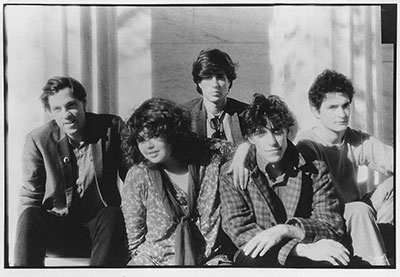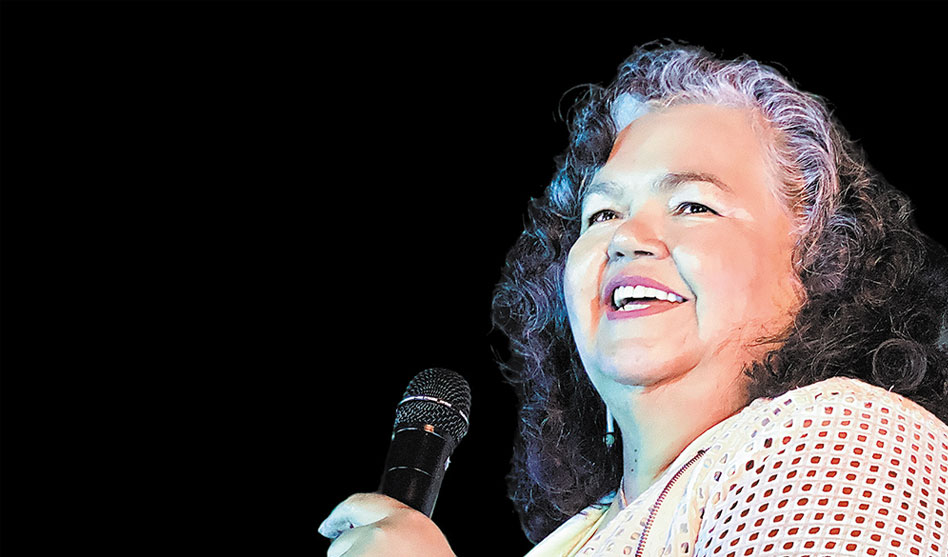Debora Lyall (Photo courtesy Tony Smith)
An interview with Debora Iyall as Romeo Void’s 1980 live recording is finally released
GREGG SHAPIRO | Q Music
GreggShapiro@aol.com
Recorded in 1980, Romeo Void’s Live From Mabuhay Gardens, November 14, 1980 (Liberation Hall) is finally seeing the light of day in 2023 — on April 22, to be precise — as a Record Store Day release. The previously unreleased 11-track live set, on opaque blue galaxy vinyl, features songs such as “Nothing For Me,” “Confrontation,” “White Sweater” and “Talk Dirty To Me,” that would later make their way to the San Francisco-based band’s exceptional 415 Records debut It’s A Condition.
Unquestionably, it was lead singer Debora Iyall’s distinctive vocals, which alternated between impassioned and indifferent (remember later singles “Never Say Never” and “A Girl in Trouble”?), that set Romeo Void apart from other bands of the era. Debora was gracious enough to make time to answer a few questions before the release of the new album.
Gregg Shapiro: Debora, I’d like to begin by asking you to confirm the story behind the band’s name Romeo Void. Is it true that it’s related to the shortage of eligible straight men in San Francisco in the late 1970s/early 1980s? Debora Iyall: Yes. Actually, it was kind of inspired by the cover of a local magazine — I think it was just called “San Francisco Magazine,” and the headline was “Why Straight Women Can’t Get Laid in San Francisco.”
A couple of band members and I were sitting around our kitchen table, and I had made lists of words to try to put together so we can come up with the name of the band. We didn’t want anything that had a “the” in it. I wanted something kind of poetic.
Did you have an awareness that Romeo Void was getting airplay outside of San Francisco? Not until we went on tour. But we went on tour pretty quickly once we put out a record. We were on 415 Records, an independent label. … We went to tons of college radio stations. That was where you met the greatest folks. Commercial radio was harder.

Romeo Void (Photo courtesy Stefano Paolillo)
I remember hoping for a Debora Iyall sighting when Romeo Void was in Boston recording the Never Say Never EP at Ric Ocasek’s Syncro Sound studio. What was that experience like for you? It was a great town to be recording in, because when you weren’t needed, there were things to do right in the neighborhood. That was awesome. Plus the people around the studio were really friendly.
Sometimes some of The Cars would come by. They were like, “Oh, we’re going next door for sushi, if anybody wants to join us.” I think I ate sushi with a couple of The Cars a couple of different times.
The new, forthcoming Record Store Day LP Live From Mabuhay Gardens, November 14, 1980 is a live recording that pre-dates the release of It’s A Condition. Did you know the recording existed, was it in your possession, or did someone else have it for safekeeping? Terry Hammer was the sound person at the Mabuhay Gardens, which is where almost all the bands in San Francisco were playing that were playing around that time. … Everybody played this one little club. He recorded tons of bands. At some point, it might have been in the ’90s, Terry approached and said, “I’ve got these great recordings of Romeo Void, would you like to hear them? I’ll dub you some copies.” So, I had heard them a long time ago. … It’s this formative picture of Romeo Void finding our sound a little bit. What strikes me when I hear it is how lucky was I to have these musicians indulge me as a singer and writer, let me create with them and make these new things happen from nothing, from a jam. Because I had no musical training.
What does it mean to you to have these eleven songs available to Romeo Void fans? I think it’s really cool that Terry Hammer kept the tapes all these years. That he was able to find an outlet like Liberation Hall. A lot of good things had to happen that weren’t on us. I just agreed to it when they put it together and I’m lucky for that, too.
I’ve had a couple other lifetimes since Romeo Void, doing other things. It’s been a lot of long years. To have our fans, who really understood Romeo Void, how it worked in their lives, to be behind that. Terry was obviously one of those people and Liberation Hall has to be those people, they put so much effort into making this happen.
After Romeo Void, you’ve worked for many years as a teacher. Have you encountered students who are familiar with your work in Romeo Void, and if so, how did they react to you being their instructor? I would have to say not too much. But parents of students will tell them, “You need to ask her if this is her!” Or they’ll come to back-to-school night to tell me, “I listened to all your records.” Or even some grandparents, because some of the students’ grandparents are the ones that listened to my music.
Were you and the other members of Romeo Void aware of an LGBTQ following for the band, and if so, what did that fanbase mean to you? Oh, always! And they were some of our best friends. Our sound man Louie, who did the first recordings of us in the studio, was my roommate. Different people that we would connect with when we went to New York, who were gay, that we knew back in San Francisco. When we went to New York, they came to our shows. You just embrace and love who you’re around.


